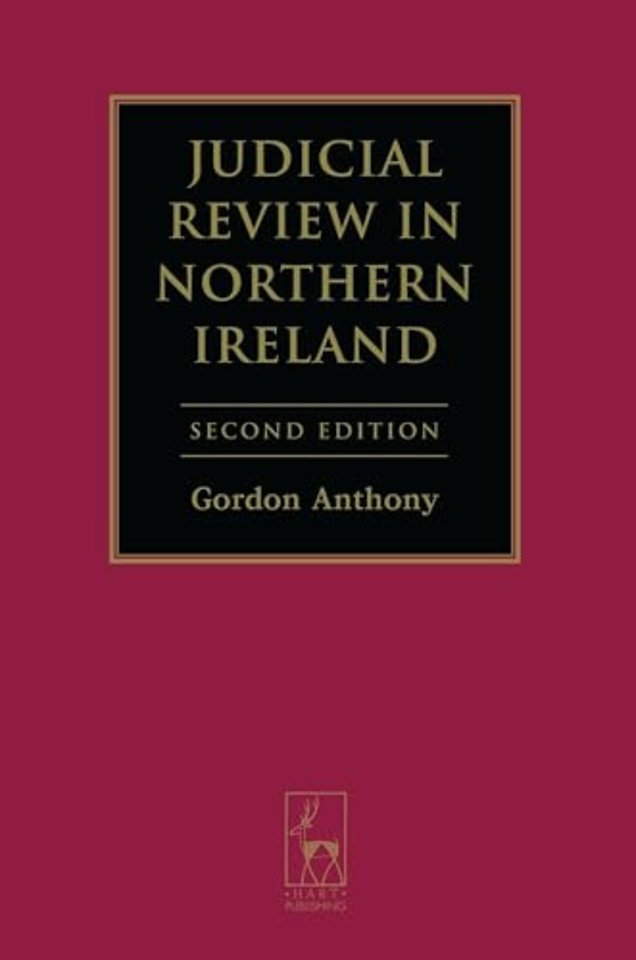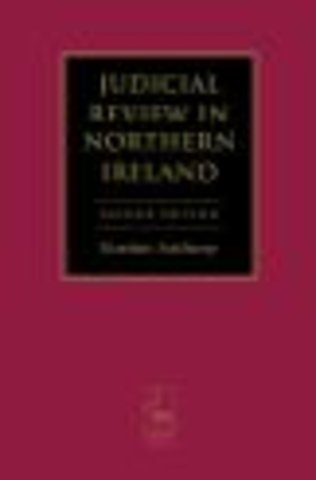Judicial review in Northern Ireland
Samenvatting
This is the second edition of Hart's leading book on the principle and practice of judicial review in Northern Ireland. Providing a fully updated account of the ever-burgeoning body of case law, it divides into eight chapters that consider the purposes of judicial review; the nature of the public-private divide in Northern Ireland law; the judicial review procedure; the grounds for review; and remedies. As with the first edition, the focus of the book is very much on case law that is unique to Northern Ireland, and the book identifies some important differences between principle and practice in Northern Ireland and England and Wales. It also considers the leading Human Rights Act decisions of the Northern Ireland courts and the House of Lords and UK Supreme Court.The book has been written primarily for practitioners of judicial review and uses numbered paragraphs for ease of reference. The book is, however, of much wider interest and is a valuable resource for academics and students alike. Much of the Northern Ireland case law has been concerned with contentious political issues, and the courts have had to consider difficult questions of the constitutional limits to the judicial role in review proceedings. The book should therefore be of use not just to practitioners but also to those involved in the study of judicial reasoning in different jurisdictions (both within the UK and elsewhere).
Specificaties
Inhoudsopgave
Foreword from the First Edition
Preface
Acknowledgements
Table of Abbreviations
Table of Cases
Table of Statutes
1. Judicial Review in Northern Ireland: Purposes, Sources of Law, and
Constitutional Context
[1.01] Introduction
[1.04] What Is Judicial Review, and What Are its Purposes?
[1.11] Sources of Law
[1.12] Statute Law
[1.14] The Common Law
[1.16] EU Law
[1.20] The ECHR
[1.23] Unincorporated International Treaties and Customary International Law
[1.25] Statutory Interpretation
[1.28] ‘Constitutional Statutes’: The European Communities Act 1972,
The Human Rights Act 1998, and The Northern Ireland Act 1998
[1.29] The European Communities Act 1972
[1.31] The Human Rights Act 1998
[1.34] The Northern Ireland Act 1998
[1.37] Conclusion
2. When Is the Judicial Review Procedure Used? The Public/Private
Divide and Eff ective Alternative Remedies
[2.01] Introduction
[2.03] The Problem of the Province of Judicial Review
[2.06] Tests for Issues Amenable to Judicial Review
[2.07] The ‘Source of Power’ Test: Statute
[2.10] The ‘Nature of the Issue’ Test and Public Sector Employment Disputes
[2.14] The ‘Public Interest’ Test
[2.18] ‘Public Functions’ and ‘Emanations of the State’
[2.22] Section 6 of the Human Rights Act 1998
[2.26] The Northern Ireland Act 1998 and the Freedom of Information
Act 2000
[2.28] Procedural Exclusivity and Eff ective Alternative Remedies
[2.30] Procedural Exclusivity and the ‘Anti-technicality’ Provision
[2.34] Eff ective Alternative Remedies
[2.36] Satellite Litigation
[2.38] Conclusion
3. The Judicial Review Procedure
[3.01] Introduction
[3.04] Deciding to Proceed
[3.05] Is there a Decision, Act, Failure to Act, or Other Measure?
[3.09] Does the Decision or Other Measure Sound in Public Law?
[3.10] Would Review Proceedings be Appropriate (in light of alternative
remedies, prematurity, and so on)?
[3.14] Pre-Action Protocol
[3.17] The Leave Stage
[3.18] Making the Application
[3.21] Criminal Causes
[3.23] The Human Rights Act 1998; and ‘Devolution Issues’
[3.25] The Onus of Proof and the ‘Arguable Case’ Threshold
[3.28] Delay
[3.31] Standing
[3.32] Urgent Cases
[3.33] Where Leave Is Granted
[3.35] Costs
[3.37] Notice Parties
[3.39] Third Party Interveners
[3.42] Where Leave Is Refused: Appeals
[3.44] Interim Matters
[3.44] Remedies
[3.44] Stays, Interim Declarations, and Interim Injunctions
[3.47] The European Communities Act 1972 and EU Law
[3.49] The Human Rights Act 1998
[3.50] Discovery
[3.50] The General Position
[3.55] The Human Rights Act 1998
[3.57] Public Interest Immunity
[3.58] The Freedom of Information Act 2000
[3.61] Cross-examination and Interrogatories
[3.63] Papers for the Hearing
[3.65] The Grounds for Review
[3.66] Standing
[3.66] The General Position
[3.69] Section 7 of the Human Rights Act 1998
[3.73] Third Party Interveners
[3.74] Remedies
[3.75] The Range of Remedies
[3.76] The Judicature (Northern Ireland) Act 1978 and RCJ Order 53:
The Prerogative Orders, Declarations, and Injunctions
[3.77] The Judicature (Northern Ireland) Act 1978 and RCJ Order 53:
Damages
[3.78] The Judicature (Northern Ireland) Act 1978 and RCJ Order 53:
Other Disposals
[3.79] The European Communities Act 1972 and EU Law
[3.82] The Human Rights Act 1998 and the ECHR
[3.84] The Prerogative Orders, Declarations, and Injunctions:
Their Discretionary Nature
[3.85] Utility
[3.87] Conduct of Applicant
[3.88] Delay
[3.89] Standing
[3.90] Alternative Remedies
[3.92] Appeals
[3.95] Costs
[3.97] Conclusion
4. The Grounds for Review Introduced
[4.01] Introduction
[4.03] The Constitutional Purposes of, and the Limits to, the Grounds for
Review
[4.04] ‘Root Concepts’ of the Common Law and the ‘Rule of Law’
[4.06] Non-statutory Power and the Rule of Law: The Royal Prerogative
[4.09] The Rule of Law and Parliamentary Sovereignty
[4.10] Ouster Clauses and Time-limits
[4.14] Context-sensitivity: Justiciability, Reviewability, and Deference
[4.18] National Security
[4.20] Law, Politics, and ‘Soft-edged’ Review
[4.22] Powers, Duties, and Discretion
[4.23] Powers and Duties
[4.26] Duties and Discretion
[4.29] Errors of Law and Errors of Fact
[4.30] Errors of Law
[4.30] The Anisminic Principle
[4.32] Courts of Law
[4.35] ‘Domestic’ Decision-makers
[4.36] Errors of Fact
[4.38] Precedent Fact
[4.40] Relevancy
[4.42] ‘No Evidence’
[4.43] Error of Material Fact
[4.45] Conclusion
5. Illegality
[5.01] Introduction
[5.04] ‘Constitutional Statutes’ and Illegality
[5.06] The European Communities Act 1972
[5.12] The Human Rights Act 1998
[5.13] Primary Legislation
[5.16] Subordinate Legislation
[5.18] Public Authorities
[5.22] The Northern Ireland Act 1998
[5.24] Acts of the Assembly/Orders in Council
[5.27] Statutory Rules
[5.29] Public Authorities (including Northern Ireland Ministers and Departments)
[5.34] Subordinate Legislation and Illegality
[5.41] Discretion and Illegality
[5.43] Relevancy
[5.48] Purposes
[5.51] Bad Faith
[5.53] Delegation
[5.56] Fettering of Discretion
[5.59] Conclusion
6. Substantive Review: Wednesbury, Proportionality, Legitimate
Expectation, Equality
[6.01] Introduction
[6.05] Wednesbury Unreasonableness/Irrationality
[6.07] Wednesbury Unreasonableness: Its ‘Umbrella’ and ‘Substantive’ Meanings
[6.09] Wednesbury Unreasonableness and Context Sensitivity
[6.12] Proportionality
[6.14] Proportionality and the European Communities Act 1972
[6.18] Proportionality and the Human Rights Act 1998
[6.20] Proportionality in the ECHR and the ‘Margin of Appreciation’
[6.23] The Standard of Review in Domestic Law
[6.25] The ‘Discretionary Area of Judgment’
[6.27] The Relationship between Proportionality and Wednesbury?
[6.29] Legitimate Expectation
[6.33] Lawfully Created Expectations
[6.33] When are they Recognised?
[6.37] How are they Protected?
[6.41] Unlawfully Created Expectations
[6.42] Representations that are Ultra Vires the Authority
[6.44] Unauthorised Representations that are Intra Vires the Authority
[6.46] Equality
[6.50] Common Law Equality
[6.52] Statute Law and Equality
[6.54] EU Law and Equality
[6.57] Article 14 ECHR and the Prohibition of Discrimination
[6.60] Conclusion
7. Procedural Impropriety
[7.01] Introduction
[7.05] Some Definitional Points
[7.07] The Relationship between Statute Law and the Common Law
[7.09] The Reach of Common Law Fairness
[7.09] ‘Rights’, ‘Interests’, and ‘Legitimate Expectations’
[7.11] Fairness as a Context-dependent Requirement
[7.13] Procedural and Substantive Fairness
[7.15] The Scope of Article 6 ECHR
[7.18] Procedural Requirements and Statute
[7.19] Ascertaining Legislative Intent
[7.23] Consultation
[7.26] Reasons
[7.31] The Right to a Hearing
[7.35] The (Variable) Content of the Right to a Hearing
[7.36] Notification
[7.41] The Nature of the Hearing and Evidence
[7.44] Representation
[7.46] Reasons
[7.50] Appeals and Rehearings
[7.52] When Is the Right to a Hearing Modified and/or Excluded?
[7.56] Breach of the Right to a Hearing: Remedies and Waiver
[7.62] The Rule against Bias
[7.65] Actual Bias
[7.66] Apparent Bias
[7.67] Automatic Disqualifi cation: ‘Pecuniary Interests’ and ‘Parties to the
Dispute’
[7.69] Other Forms of Disqualifying Bias
[7.71] Politics, Policy, and Bias
[7.73] Article 6 ECHR: ‘Bias’, ‘Independent and Impartial Tribunals’,
and ‘Full Jurisdiction’
[7.80] Exceptions to the Rule against Bias: Statute, Necessity, and Waiver
[7.83] Breach of the Rule against Bias: Remedies
[7.84] Conclusion
8. Remedies
[8.01] Introduction
[8.03] The Origins, and Discretionary Nature, of the Remedies
[8.03] Origins
[8.05] The Position of the Crown and its Ministers
[8.08] Their Discretionary Nature
[8.10] The Judicature (Northern Ireland) Act 1978 and RCJ Order 53
[8.11] The Prerogative Orders, Declarations, and Injunctions
[8.11] Mandamus
[8.13] Certiorari
[8.16] Prohibition
[8.17] Declaration
[8.19] Injunction
[8.21] Damages
[8.23] Negligence
[8.26] Breach of Statutory Duty
[8.28] Misfeasance in Public Office
[8.30] False Imprisonment
[8.31] The ‘Holding of Public Offi ce’ and ‘Sentences in Criminal Cases’
[8.33] The European Communities Act 1972
[8.35] Injunctions and Ministers of the Crown
[8.37] Damages
[8.40] Discretionary Remedies—The Walton Case
[8.41] The Human Rights Act 1998
[8.42] Binding Remedies
[8.42] The Relationship between Sections 6–8
[8.44] Damages
[8.47] Declarations of Incompatibility
[8.50] Conclusion
Index
Anderen die dit boek kochten, kochten ook
Net verschenen
Rubrieken
- aanbestedingsrecht
- aansprakelijkheids- en verzekeringsrecht
- accountancy
- algemeen juridisch
- arbeidsrecht
- bank- en effectenrecht
- bestuursrecht
- bouwrecht
- burgerlijk recht en procesrecht
- europees-internationaal recht
- fiscaal recht
- gezondheidsrecht
- insolventierecht
- intellectuele eigendom en ict-recht
- management
- mens en maatschappij
- milieu- en omgevingsrecht
- notarieel recht
- ondernemingsrecht
- pensioenrecht
- personen- en familierecht
- sociale zekerheidsrecht
- staatsrecht
- strafrecht en criminologie
- vastgoed- en huurrecht
- vreemdelingenrecht







